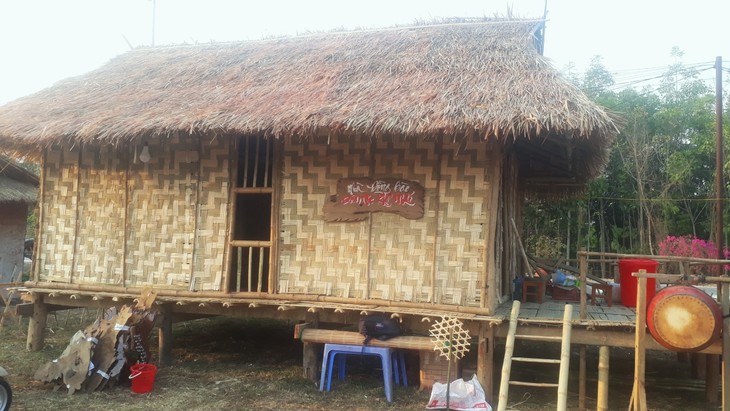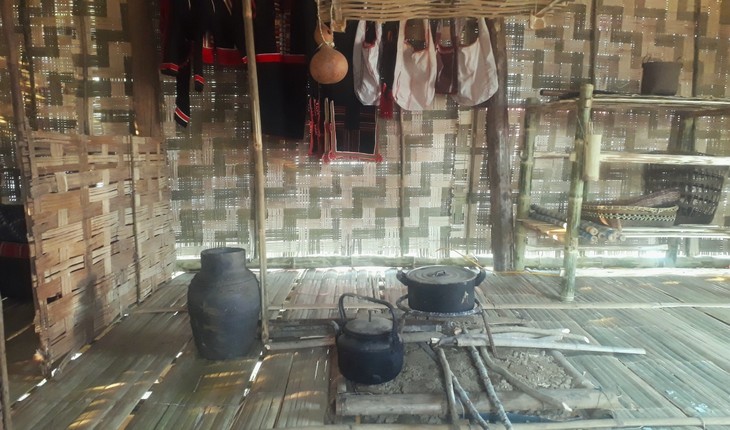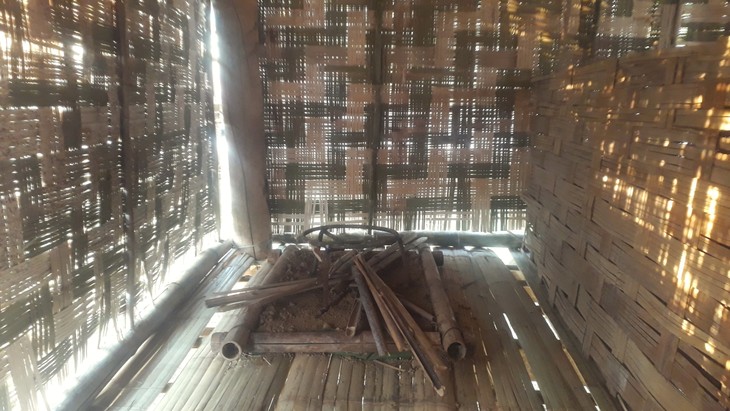(VOVWORLD) - For the Kho Mu ethnic minority group, a woodstove is not only used for cooking but is also considered a sacred god. The Kho Mu worship the Fire God, who brings prosperity and happiness to the family and village.
 A simulation of the traditional stilt house of the Kho Mu in Muong Ang district, Dien Bien province (photo: Tong Duc Anh/ VOV) A simulation of the traditional stilt house of the Kho Mu in Muong Ang district, Dien Bien province (photo: Tong Duc Anh/ VOV) |
In the Kho Mu culture, fire is a symbol of life. The placement of the woodstove must follow fengshui and other strict rules. Quang Van Ca of Dien Bien province, said: “After building a house, the home owner invites an older or younger brother of his wife to help install a woodstove. This shows his respect for his in-laws and his wish for the best for his family.”
The traditional stilt house of the Kho Mu must have two woodstoves – one in the last room of the house and one in the main room below the ancestral altar. This is a sacred place, prohibited to strangers. Only family members are allowed here.
“The woodstove in the main room is used for boiling water and cooking food, except sticky rice. It’s close to the ancestral altar and only the owner is allowed to sit beside it, not guests. The owner is not allowed to grill meat on the woodstove next to the altar,” said Ca.
 A woodstove in the main room in the Kho Mu's house (photo: Tong Duc Anh/ VOV) A woodstove in the main room in the Kho Mu's house (photo: Tong Duc Anh/ VOV) |
To set up the woodstove, the owner uses 4 wooden bars to make a sturdy square frame with a layer of fresh banana bark at the bottom. Then he fills the frame with wet soil and presses it to make it firm. The more the soil is compacted, the less likely it is to crack later. Three stones are placed on the earthen-foundation to make a tripod for cooking.
Quang Thi Vu of Dien Bien province said: “The kitchen in the innermost room is only used for cooking sticky rice and distilling liquor, and used to be a place where women delivered babies. In the past ethnic groups in remote mountain areas gave birth at home with the help of relatives who had maternity experience. Following childbirth, they boiled water to bathe the baby. The woodstove was always lit to keep the mother and baby warm during postpartum confinement.”
 A woodstove in the innermost kitchen (photo: Tong Duc Anh/ VOV) A woodstove in the innermost kitchen (photo: Tong Duc Anh/ VOV) |
According to Kho Mu custom, when the man who is the breadwinner of the family dies, all cooking must be done in the innermost kitchen. But when a woman dies, it’s prohibited to cook in the innermost kitchen. It can only be done in the main hall.
The woodstove is a place where family members gather to discuss family matters and women sit by the fire to weave cloth at night. The custom of worshiping the Fire God, who brings good luck and wards off evil, has been maintained by generations of Kho Mu.